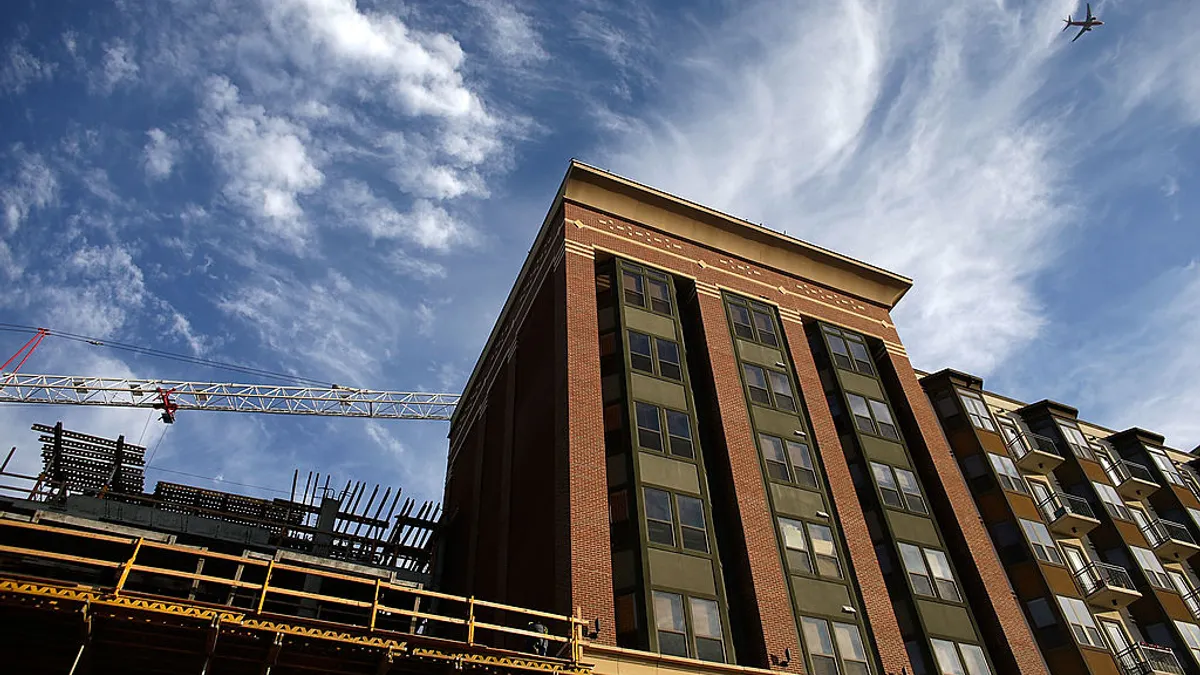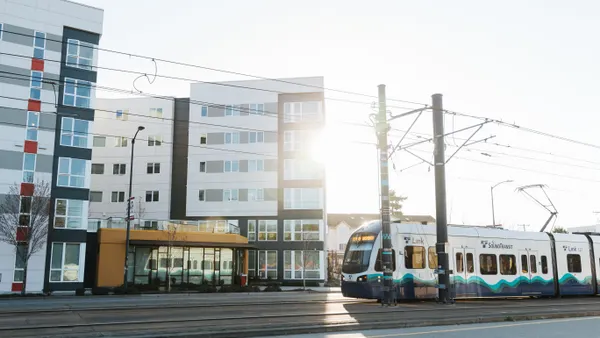Dive Brief:
- Texas’ newly enacted affordable housing law House Bill 21, which significantly changed how the state’s affordable housing projects can access property tax exemptions, faces a lawsuit from a group of developers. The plaintiffs warn HB 21’s changes are unconstitutional and will displace swathes of working-class residents who no longer meet the stricter affordability standards.
- The Texas Workforce Housing Coalition, a group representing affordable -housing developers, and Post WB Apartments LLC filed suit against the Bexar Appraisal District on Sept. 9 in Cameron County District Court. They want the court to declare HB 21 unconstitutional and affirm that housing finance corporations are allowed to own property outside their local areas.
- The bill is the most comprehensive state response yet to concerns surrounding “traveling” housing finance corporations that partner with developers to acquire properties in other parts of the state and claim tax exemptions outside their founding jurisdictions without local consent, per a June analysis from law firm Holland & Knight.
Dive Insight:
Previously, under Texas law Chapter 394, if developers partnered with a publicly sponsored Housing Finance Corporation and rented to low- or moderate-income tenants, they would receive a 100% property tax exemption. HB 21 changed the laws governing these deals and applied them retroactively to some contracts signed under the old Chapter 394.
For lenders financing projects that rely on the property tax exemptions that finance corporations can provide, HB 21 creates immediate and long-term uncertainty, per Holland & Knight, as well as “new and meaningful compliance risks, timeline delays and underwriting complexities for lenders and developers.”
The plaintiffs argue the law will fundamentally rewrite the terms of affordable housing development deals that were signed years ago, and that retroactively changing these rules will create broader uncertainty. They say that appraisal districts have begun weaponizing HB 21 by reversing their own prior approvals of deals they now say were never legal, even under the old Chapter 394.
"The State of Texas lured billions of dollars worth of investments from real estate developers to build affordable housing for working class Texans with the promise of favorable tax treatment only to now pull the rug out from under those developers," Gibson Dunn & Crutcher Partner Trey Cox, lead attorney in the case, said in the release. "The unconstitutional implementation of HB21 is nothing less than the breakdown of the rule of law in Texas.”
In May, Texas Gov. Greg Abbott signed HB 21, which was authored by Rep. Gary Gates (R-Rosenberg) and sponsored in the Senate by Sen. Paul Bettencourt (R-Houston), in response to concerns about the benefit of the program to jurisdictions.
“For years under current law, Housing Finance Corporations (HFCs) entities formed by cities and counties, intended to support low-income housing, have been exploited by developers partnering with out-of-jurisdiction ‘traveling’ HFCs to receive full property tax exemptions for multifamily housing, with no rent reductions, local approval or community benefit,” according to the Senate press release.
Per the release, changes to Chapter 394 of the Local Government Code — which apply to both new and existing deals — require:
- City or county approval for every HFC deal or project.
- At least 50% of all units set aside as affordable for low-income families.
- Rent reductions equal to at least 50% of the tax savings.
- Annual independent audits submitted to the state housing agency.
- Compliance deadlines for existing properties: 2027 for audits, 2035 for affordability.
These formulas are significantly more stringent and must be verified through an independent annual audit, according to Holland & Knight. Multiple lawsuits filed by local jurisdictions are currently pending regarding the legality and future viability of the HFC financing model.
Texas passed another piece of legislation this summer that’s been welcomed by the multifamily industry. Texas Senate Bill 840, which went into effect in September, aims to simplify the conversion of nonresidential sites into mixed-use or multifamily properties — a move that previously would have required developers to pursue rezoning approval from municipalities.










